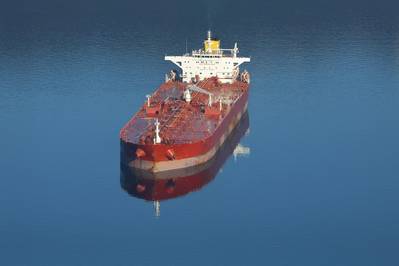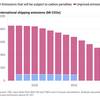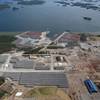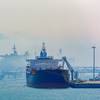Port Constraints for Canada's Trans Mountain Pipeline May Crimp Oil Exports
Logistical constraints at the Port of Vancouver mean waterborne oil exports from the highly anticipated Trans Mountain pipeline expansion due to start up on Wednesday may only be around half what the Canadian government-owned corporation has forecast, traders and shipping sources said.
The C$34 billion ($24.82 billion) project to nearly triple the flow of crude from Alberta to Canada's Pacific Coast to 890,000 barrels per day is scheduled to start operating on May 1 after years of regulatory delays and construction setbacks.
The extra 590,000 bpd of oil will be delivered to the Westridge Marine Terminal where it can be loaded onto tankers, giving Canadian producers more access to U.S. West Coast and Asian markets.
Trans Mountain says it has capacity to load 34 Aframax ships a month, but ship brokers and analysts have pegged the likely number at less than 20, citing concerns about pilot and tug boat availability and loading restrictions.
"Theoretically they can handle the volumes, but auxiliary or secondary services are not ready for huge volumes," said Rohit Rathod, senior oil market analyst at ship tracking firm Vortexa.
Ship broker BRS estimated only 15-17 Aframaxes a month would leave Westridge dock. Over the last few years, data showed loadings at Westridge have averaged one or two Aframaxes per month, BRS said, suggesting a significant increase in tanker traffic.
Vessels leaving Westridge dock must pass through a busy narrow shipping channel that runs beneath two major bridges to reach the open sea.
To manage high traffic in the channel, the Port of Vancouver has restrictions including daylight-only transit for Aframax tankers and specific transit times based on tidal currents, said Sean Baxter, the port's acting director of marine operations.
Aframaxes typically transport up to 800,000 barrels but at Westridge they will be limited to loading around 550,000 barrels because of draft restrictions.
Tankers carrying Trans Mountain crude will also have to be accompanied by a pilot and a tug boat for longer on each voyage, as part of new regulations imposed on the expansion project.
Higher freight costs
Traders and analysts said any slippage in the loading schedules could push up freight costs for shippers.
Extended time at anchorage and in port due to delays can increase demurrage charges, fees levied for using a vessel beyond set dates, said Brendan Hoffman, CEO of shipping consultancy service Haugen Consulting LLC. It could also tighten the supply of available Aframax vessels, he added.
That would add to already-high pipeline tolls at the same time increased demand for oil to feed the pipeline is expected to boost prices for Canadian heavy crude, which may limit demand from Asian buyers, redirecting crude to the U.S. West Coast.
Shipping crude on an Aframax directly to China would take about 18-20 days and cost about $17.42 a barrel, including pipeline tariffs, according to BRS. Meanwhile, it would take 2-3 days to get to California.
Brian Young, chief operating officer for the Pacific Pilotage Authority in Vancouver, said port authorities will be able to handle the increased traffic and there were enough pilots trained to meet the extra demand.
"The existing regime has been in place for 30 years, it's just going to be more of the same," said Young, adding he expected there to be a gradual increase in vessels loadings with Trans Mountain crude over the next 12 to 18 months.
Trans Mountain said its design for the expanded pipeline system gave careful consideration to various marine logistics factors including tides, drafts, weather, and daylight restrictions.
"Our engineering studies and simulation work indicate we will be able to meet contractual requirements given these external factors," a spokesperson said in an email.
"Oil markets will determine how many and how often tankers will call at the terminal month to month."
Aframax oversupply
Trans Mountain expects the first tanker to load at Westridge in the second half of May.
One shipping source said it was still unclear how much demand for Aframaxes to transport Trans Mountain crude would materialise in the near-term.
"We're literally waiting like crows with some of ours (ships)," said the source, who was not authorized to speak on the record. "The question is do we keep waiting like vultures or reposition our Aframaxes to other markets."
An oversupply of Aframax crude tankers on the west coast of the Americas in anticipation of the Trans Mountain expansion pressured Vancouver-loading rates to six-month lows on April 19, said Tray Swanson, a freight pricing analyst at Argus.
About 27 Aframax vessels that could carry crude oil were waiting along the Pacific Coast for charters to pick up TMX cargo, according to Vortexa, with at least 14 of them being empty.
"Shipowners have positioned more vessels to be on the west coast to satisfy anticipated demand in Vancouver, but that demand has yet to materialize, leaving the Aframax market oversupplied for now," Swanson said.
Any delays in shipping could also fuel volatility in oil prices in Alberta.
"There's no make-up capacity if there's a lost day (at Westridge)," one Calgary-based oil broker said.
"There's not enough storage down on the dock so it will back up in Edmonton."
($1 = 1.3698 Canadian dollars)
(Reuters - Reporting by Nia Williams and Arathy Somasekhar; Editing Liz Hampton and Marguerita Choy)













